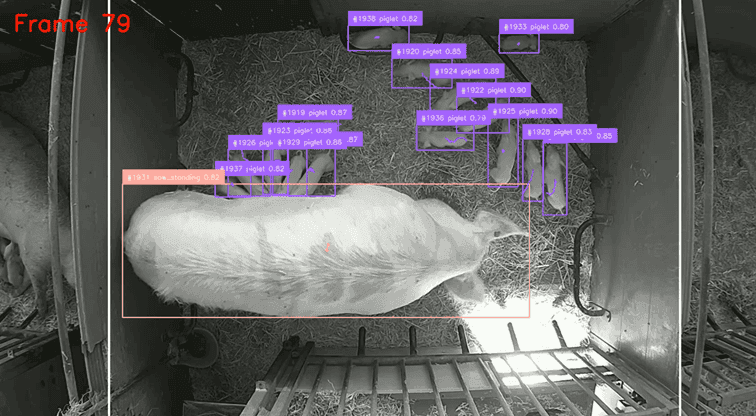Bart, co-founder of Media52 and Professor of Journalism oversees IO+, events, and Laio. A journalist at heart, he keeps writing as many stories as possible.
BaiTech uses artificial intelligence to prevent piglet deaths in farrowing pens. It is a well-known problem for sows to lie down on piglets. The first few days are especially crucial for piglets' survival. BigLife is seen as a promising practical solution to combat piglets lying dead by sows. An image-recognition camera recognizes situations when a sow lies down on her piglets. When this happens, the screeching sound of a piglet is heard. This stimulates the sow to get up again.
Sander Baijens and Bas Josten are BaiTech's co-founders. We asked them about their company's mission, AI's role, and their plans for the future.
"We use computer vision software, specifically deep-learning algorithms. The use of computer vision in animal husbandry is itself very unusual. The few applications where it is used are only done passively, to recognize or monitor certain animals. Farmers then often get a lot of information on a dashboard, which then has to be acted upon themselves. We use computer vision to recognize the situation where a sow (mother pig) is lying on top of one or more of her piglets. What makes our product unique is that we also intervene autonomously. When the system recognizes this situation, the sound of a screaming piglet is played. This signals to the sow that her piglets are not doing well, to which she responds by standing up. This keeps the piglets alive.”
“Our product is highly scalable; we are therefore strongly focusing on an international market, initially in Europe, but later globally, which is definitely our goal. Right now, we are still in the development phase. After that, we expect to conquer the international market quickly. After all, our product can be applied to both large and small companies; the company's size simply determines how many devices are needed.”
“Within our specific field, we don't face many ethical dilemmas; we simply save the lives of newborn piglets with this product. The biggest ethical risk is that we may leave a sow up several times unnecessarily. We think this is justifiable if we save piglet lives by doing this.”
“It is known that when sows can move around freely, they are more likely to lay on their own piglets. For this reason, sows are often secured in a farrowing cage during the farrowing period because the risk is simply too great. With BigLife, this is no longer necessary because we help the sow get up again if she accidentally lies down on a piglet. Eventually, this will allow all sows to move freely during the farrowing period. So it's better for the sow, the piglets, and the farmer.”
“Our biggest challenge so far has been really getting development going. This has taken quite some time. A good idea alone does not yet yield partners who can co-develop it. By collaborating with Wageningen University & Research, among others, in a PPP project, we have really been able to take our development to the next level.”
External Content
This content is from spotify. To protect your privacy, it'ts not loaded until you accept.
“These laws mainly apply to the use of AI focused on humans. With our application for animals, we fortunately don't have to deal with this much yet.”
“We expect to be among the standard equipment of a pig barn in 10 years. We want to expand our software much further to include many other interesting detections in the areas of both animal welfare and disease recognition.”
“We have a clear goal, great market potential, and a clear solution. We can make a change within the livestock industry.”

